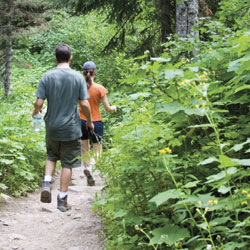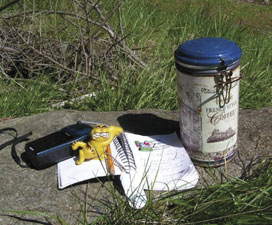As technology advances, so does our pursuit of leisure. One of today’s hottest hobbies brings together innovative technologies with a love of nature. While there once was a time when nature lovers weren’t exactly computer literate, and techies rarely strayed from their monitors, geocaching has made outdoor enthusiasts tech-savvy and given computer lovers a reason to get out and enjoy the world around them.
Birth of a Pastime
On May 1, 2000, President Clinton announced that Selective Ability (SA), the filtering mechanism which scrambled the Global Positioning System (GPS) to prevent civilians from accessing the signal, would be turned off. The satellite navigation system was originally developed by the U.S. Department of Defense and intended solely for military use. But once SA was shut off, civilians were able to utilize the GPS system to an accuracy of about 10 meters. At the time, few imagined that such a development would lead to the birth of a fresh, new hobby for the 21st century.
To celebrate the occasion, Dave Ulmer, a resident of Portland, Oregon, stashed a bucket of trinkets in the woods near his home and posted its location via GPS coordinates online. “Within a day, the original stash had been found. Within days, more stashes had been hidden in California, Kansas and Illinois. Within a month, a stash had been hidden as far away as Australia. The hobby [of geocaching] was fast on its way to being a worldwide phenomenon,” reports gpsgames.org.
Geo-What-ing?
As explained on geocaching.com, the official global GPS cache hunt site, the prefix geo- was used to represent the global nature of the activity. Caching, from cache in its original French, describes a hiding place one could temporarily use to store objects. Cache also describes computer storage used to quickly retrieve frequently-used information, as in memory cache. “The combination of Earth, hiding and technology made geocaching an excellent term for the activity,” claims the site. In laymen’s terms, it’s a high-tech scavenger hunt.
While geocaching has evolved since its creation in 2000, the main principle remains the same: take something, leave something, sign the logbook. Today, most geocachers set up accounts on geocaching.com through which they gather coordinates of caches they intend to find, log those they have found and utilize other resources provided by the website. 
Mark and Laura Hartman, who took up geocaching three-and-a-half years ago, were nice enough to walk me through their unique hobby. Upon receiving a GPS device as a Christmas present, the Hartmans were introduced to geocaching by Mark’s mother. They soon discovered that this new pastime gave them a reason to get out and enjoy nature—as well as a mission. The couple found that caching introduced them to the nooks and crannies of Peoria—with caches hidden in places that even Mark, a longtime Peoria resident, didn’t know existed.
Ron Renken, a geocacher from Washington, Illinois, said he and his wife experienced this same benefit. “The main thing we enjoy about caching,” he explained, “is that it introduces us to unique areas that we would normally not see. We try to cache on all of our trips, and these caches have led us to exciting places, like secluded monasteries in Maine and prehistoric footprints in Ohio.”
Josh Harris, another geocacher from Peoria, reported that he and his family “have seen some neat parks and out-of-the-way places that I know we never would have found if it wasn’t for geocaching.” The most interesting place the hobby has taken his family is to California’s Big Sur—and a 50-foot waterfall that runs straight into the ocean.
Good, Clean Fun For All
Geocaching, sometimes described as a computer game that actually gets you out of the house, is a family-friendly activity. I’m told that kids are sometimes better at finding caches because they are more likely to think “outside the box.” For this reason, some of the best geocachers are those who team up with family and friends of different ages. Harris said one of the hobby’s most appealing features is “that families can do it together. Our five-year-old son loves to go geocaching.”
Geocaching is environmentally friendly as well, with many geocachers adopting what is called the “Cache In, Trash Out” (CITO) philosophy. Geocaching.com suggests, “Bring a trash bag along with you on your walks in the woods and pick up the occasional piece of trash you see on the trail. Even this small act can make a huge difference.” There is even a national CITO event each year, but geocachers can apply this concept every time they go out on a hunt.
Get Caching!
Becoming a geocacher is actually quite easy—I did it in a matter of minutes. First, sign up for a free account on geocaching.com. From there, one can search for caches by zip code, state or country, and from the list of results, select the caches they’d like to find and obtain their coordinates.
All caches on geocaching.com receive two ratings—the difficulty of finding the cache after reaching the given coordinates (how well it’s hidden) and how hard it is to navigate the terrain in order to get there. Ratings are based on a one-to-five scale, one being the easiest and five the most difficult.
There are several different types of caches, and they come in all shapes and sizes. Traditional caches consist of at least a container and a logbook. These range in size from “micro caches,” which could be as small as film canisters—or even tiny magnets that hold logbooks to the underside of park benches—or as large as old ammo boxes, for example. If the container is large enough, there’s a good chance you’ll find trinkets inside. Many geocachers take trinkets with them in case they find a cache with items to trade. The Hartmans said trinkets can take the form of anything from a toy car to a $100 bill!
 Some trinkets found in geocaches are trackable, and some of these come with missions. One great example is called Golfin’ Garfield. The Hartmans came upon this trinket, whose mission was to have his picture taken at numerous golf courses around the world and eventually make it back to St. Andrew’s Golf Course in Scotland, where the sport originated. It took only seven months for Golfin’ Garfield to complete his mission, after which he continued to tour golf courses around the globe.
Some trinkets found in geocaches are trackable, and some of these come with missions. One great example is called Golfin’ Garfield. The Hartmans came upon this trinket, whose mission was to have his picture taken at numerous golf courses around the world and eventually make it back to St. Andrew’s Golf Course in Scotland, where the sport originated. It took only seven months for Golfin’ Garfield to complete his mission, after which he continued to tour golf courses around the globe.
Multi-caches consist of two or more locations. The fun of these caches is that the first location only contains clues to the next one, the last of which is the physical cache with its logbook. Some multi-caches give exact coordinates, while others contain riddles that must be solved to learn the next location.
Mystery/puzzle caches, as their name suggests, cannot be found unless puzzles are solved. The answer to riddles usually contain the coordinates needed to make the find.
Event caches are events at which geocachers in an area get together to discuss geocaching and put faces to the names of the cachers they have seen in online logs. Many times, groups go caching together after gathering for a meal. Some of Peoria’s event caches have taken place at Hometown Buffet on Big Hollow Road.
Webcam caches are quite different from traditional caches. The coordinates of these are not locations of physical caches containing logbooks, but locations that can be seen via webcams on the Internet. In order to log a visit to a webcam geocache, cachers must have a friend go online while they appear on the webcam that views the given coordinates and save a screenshot of them in front of the camera.
Each cache listed on geocaching.com is assigned a number, and its owner is responsible for maintaining the cache throughout the year. After signing a logbook, cachers sign in to their account on geocaching.com and log the date on which they found a particular cache. There is also the option of leaving a note for others to read. These notes sometimes contain spoilers, which provide details that essentially ruin the hunt for others. Notes may also alert the owners if cachers are having difficulties finding particular caches. The owner will then look into whether his/her cache was moved or damaged, or is gone altogether.
From its relatively recent origins, geocaching has evolved into a pursuit shared by people from all walks of life. In times like these, when the word recession is whispered and gas prices are skyrocketing, this hobby, with its low start-up costs, has been embraced by many. From its somewhat accidental beginnings, geocaching has intrigued young and old alike around the world.
Kickapoo Creek Primezone
You probably didn’t know that central Illinois has its own version of the Bermuda Triangle! The Kickapoo Creek Primezone is an area where GPS receivers mysteriously go wacky and cannot register correct latitudinal and longitudinal coordinates. “Unlike the vast Bermuda Triangle,” a cache description on geocaching.com says, “our much smaller aberration is almost perfectly square in shape. It covers 20 acres of forested parkland” at Jubilee College State Park in Kickapoo.
Geo Lingo
Much like the abbreviations that have become common for IMing, emailing and texting, geocachers have their own lingo. Here’s an insider’s guide to the language of geocaching.
BYOP…Bring Your Own Pen. Some cache containers are too small to hold a writing instrument so you have to bring your own.
CITO…Cache In Trash Out. When geocaching, take a bag with you and pick up trash along the way!
FTF…First To Find. Usually found in the forums or written in the online or physical log books.
Geomuggle…A non-geocacher. Usually, this term is used after a non-geocacher looks puzzled at a geocacher making circles with his/her GPS receiver, or when a non-geocacher accidentally finds a cache. Geomuggles are mostly harmless.
GPSr…GPS receiver.
Hitchhiker…An item that is placed in a cache, with instructions to travel to other caches. Sometimes they have logbooks attached so you can log their travels. A Travel Bug is an example of a hitchhiker.
TFTC…Thanks for the Cache!
TFTH…Thanks for the Hunt!
TNLN…Took Nothing. Left Nothing. Usually found in cache logbooks for folks who enjoy the thrill of the hunt more than the material contents of the cache.
TNLNSL…Took Nothing. Left Nothing. Signed Logbook.
TNSL…Took Nothing. Signed Logbook.
Source: geocaching.com
a&s


